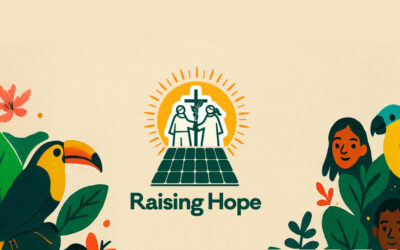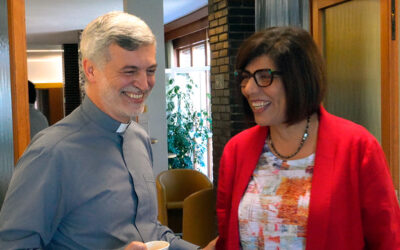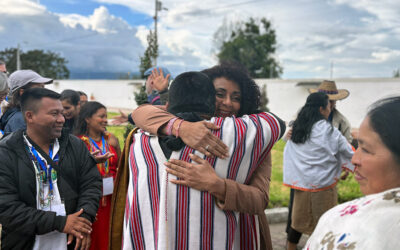 “Like you, most Salvadorians believe that to work together to build a more united Central America is not a utopia, but an aspiration inscribed in the very culture, history, and even in the topography of our region,” affirmed the President of El Salvador), Antonio Elias Saca, in his welcome address to the 2,000 people gathered in the Amphitheater of the El Salvador International Fair. The president recalled the region’s pre-Columbian cultural unity, the efforts to achieve political unity with the Central American Republic during the post-independence period (1821-1842), as well as the new efforts at unification during the latter half of the 20th century through the institution of the MERCOMUN.
“Like you, most Salvadorians believe that to work together to build a more united Central America is not a utopia, but an aspiration inscribed in the very culture, history, and even in the topography of our region,” affirmed the President of El Salvador), Antonio Elias Saca, in his welcome address to the 2,000 people gathered in the Amphitheater of the El Salvador International Fair. The president recalled the region’s pre-Columbian cultural unity, the efforts to achieve political unity with the Central American Republic during the post-independence period (1821-1842), as well as the new efforts at unification during the latter half of the 20th century through the institution of the MERCOMUN.
 The participants – many of whom were young people – came from Central American countries. As in many other regions of the world, here too a process of unification is currently taking place due to the growing awareness that only in collective efforts can a solution to current social conflicts be achieved and peace strengthened.
The participants – many of whom were young people – came from Central American countries. As in many other regions of the world, here too a process of unification is currently taking place due to the growing awareness that only in collective efforts can a solution to current social conflicts be achieved and peace strengthened.
“There is much talk about economic, social and political integration, but also a religious integration should take place as well,” emphasized Dr. Rodrigo Samayoa of the Allianza Republicana Nacional (National Republican Alliance) Party. This meeting, the first of its kind in the region’s history, was promoted by ecclesial Movements, new communities and groups belonging to different Churches, which have started directing their efforts towards achieving greater collaboration, and thus contributing to the spiritual unity of the region and of the whole Latin American continent.
The dignitaries present at the meeting included representatives of such political parties as the Farabundo Marti Front for National Liberation (FMLN) and the Democratic Revolutionary Front. Their presence was particularly welcome, considering that not many years have passed since these groups passed from the option of violence to that of politics, to restore social justice in their country. “Events like these bring us spirituality and hope, where one gives and receives,” commented Violeta Mejivar of the FMLN.
The journey towards unification received the encouragement of Pope Benedict XVI who, in his message read by the Apostolic Nunzio, Archbishop Luigi Pezzutto, exhorted everyone “to be open to the gifts of the Holy Spirit in order to progress in the journey you have undertaken, committing yourselves to building up a world faithful to God, more full of the spirit of solidarity, more just and fraternal.”
The many experiences shared revolved around the theme of peace, a new lifestyle favorable to dialogue and integration of different peoples and cultures, family values and solidarity with the poor of Central America and the world. They were offered by members of Savior of the World Movement, Charismatic Movement, Cursillos, Heraldos del Evangelio (Heralds of the Gospel), Focolare Movement, Young Christ Community, St. Egidio Community, Marriage Encounter, Prayer and Life, and Body of Christ Community.
In her message, Chiara Lubich emphasized specific characteristics of this region, rich in history, culture and art – as evidenced by the great Mayan civilization – but also marked by the sufferings caused by colonialism and civil wars; now it is displaying renewed creativity and innovative collaborative efforts.” Chiara Lubich’s message underlined “the call to unity,” and “the challenge of brotherhood,” as the way to fulfill this call.
Prof. Andrea Riccardi of St. Egidio Community emphasized in his message that in El Salvador and in other parts of the Americas, “there is a need for people who dream of a new world of peace. I feel that the meeting in Salvador brings us closer to this goal.”
 The culminating point of the event was the declaration of a commitment to peace and brotherhood presented by the delegates of the different Movements and new communities and the religious leaders of different Christian Churches: Gregorio Rosa Chavez, Catholic auxiliary bishop of El Salvador; Barahona, bishop of the Anglican Presbyterian Church; Hector Fernandez of the Lutheran Church; Miguel Tomas Castro of the Baptist Church; and Santiago Flores of the Reformed Calvinist Church.
The culminating point of the event was the declaration of a commitment to peace and brotherhood presented by the delegates of the different Movements and new communities and the religious leaders of different Christian Churches: Gregorio Rosa Chavez, Catholic auxiliary bishop of El Salvador; Barahona, bishop of the Anglican Presbyterian Church; Hector Fernandez of the Lutheran Church; Miguel Tomas Castro of the Baptist Church; and Santiago Flores of the Reformed Calvinist Church.
September, the date chosen for the meeting in San Salvador, is a symbolic month because of two dates: the 11th, anniversary of the terrorist attack on New York; and the 15th, anniversary of the Independence of Central American countries.
“Together for Central America” came as a sequel to the large meeting of 10,000 people in May 2004, in Stuttgart, Germany. Entitled “Together for Europe,” it was aimed at giving a “soul” to the process of unification of the European continent.




0 Comments